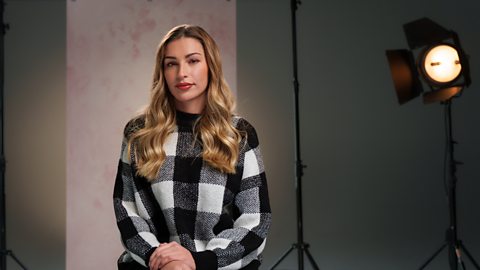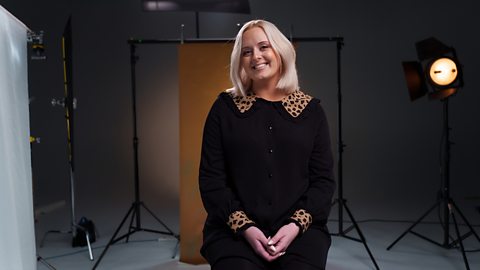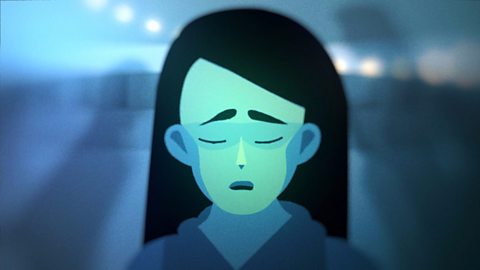Psychotherapist and counsellor Natasha Page introduces this series of films, which are intended to help to start classroom discussions around mental health. The films cover different mental health conditions and introduce us to five well-known contributors and role models who have also experienced similar issues.
Natasha outlines some of the challenges that teachers face when addressing the subject of mental health and explains what schools can do to support young people experiencing mental health issues.
She emphasises that teachers are not expected to be experts in this area but that, as trusted adults, sometimes students may open up to them. She outlines the most important steps teachers and schools can take to support a young person dealing with mental health issues.
One of the key steps for teachers is to be approachable and to listen, as they may be the first person a student opens up to about what they are experiencing. As well as listening, validating their feelings and offering reassurance, teachers can help young people to get the support and guidance they need from other trained professionals.
Talking a whole-school approach to mental health is important and Natasha explains that there are practical ways to do this that engage teachers, support staff, students, and parents.
Natasha makes suggestions about how the films can be used in the classroom to start discussions.
It’s important to remember that, if a student opens up to you, you can reassure them it is safe to do so but you should not make promises about keeping information confidential. If you have concerns about a student’s safety or suspect they may be experiencing abuse, you must report this to your school’s designated safeguarding lead.
In this film, psychotherapist and counsellor Natasha Page outlines some of the challenges that teachers face when addressing the subject of mental health.
[Katie] Hi, I'm Katie Thistleton.
[Roman] My name’s Roman Kemp.
[Zara] I’m Zara McDermott.
[Wes] I'm Wes Nelson.
[Tom] I'm Tom Grennan, and I have anxiety.
[Natasha] We know that there's still a stigma attached to mental health, and
sometimes young people don't feel that they can open up for fear of being ridiculed
by their peers or what other people say or think of them.
One of the main obstacles, that certainly when I’ve supported teachers in schools,
is that they don't have the confidence.
So they feel like, because they've not got a mental health qualification
or they're not a counsellor or therapist that they can't fulfil that role of supporting
the young person with their mental health.
But we must remember that sometimes young people just want to have someone
that's relatable, that is familiar, that they feel safe with.
and actually that key interaction of just first opening up
can be with someone that is a teacher, or someone that the young person
feels comfortable with in school.
If you can demonstrate a positive interaction with that young person
in that first moment that they may reach out for help, that can be crucial to them
then going on to receive professional help
If in that interaction they don't feel listened to, or they feel like they're being ridiculed
or that their issues aren't being taken seriously, then that can shut off the communication
And then that could stop them from getting further support
So, as teachers, obviously, you know, you're not going to provide counselling sessions
or ongoing therapeutic support, but it's just really important to remember that you could be
that key person that, that young person needs in that moment
to help them access further support.
We know that if young people are feeling more stable emotionally,
then they will be able to achieve.
And of course, when they're struggling with their mental health it’s going to be hard
to achieve the best that they can.
[Katie] I've been through what you're going through
and it made me feel anxious and stressed too.
[Natasha] I think the schools as a whole need to address mental health so
it needs to be from the top, you know, from senior leaders, down to teaching staff,
down to every member of staff and raising the awareness in schools and actually
and actually seeing this as part of the educational journey
that if you want to get the best out of students
supporting their mental health is in everyone's best interest.
Each of the films have been structured in a way that takes you from a real life scenario,
from a real young person that's called in to get some support.
And then it moves into the celebrity section where each celebrity will discuss a theme
that they've actually struggled with themselves.
It then moves on to the professional, giving some supportive advice and strategies
how young people can manage that mental health concern.
So, for example, in Zara's video, she talks about her use of social media
and the impact it's had on her self-esteem and confidence.
She very openly discusses how she uses the perfect images to post on her social media.
But actually she has millions of images that aren't so perfect.
And I think this is really powerful because of course,
young people often only see the end product of the perfect picture images.
So for them to actually hear celebrities talking openly about their own self-esteem issues
and that actually everything isn't perfect, I think really can help a young person
to identify with similar emotions that they may be feeling.
Some of the other themes that are covered in the videos are anxiety, depression
and loneliness, exam, and school-related stress, bullying,
and how to look after your wellbeing in general.
[Zara] And this really affected my self esteem. I started to question my appearance
[Tom] and it's a bit like butterflies, but then the butterflies become more intense
and more intense and more intense.
[Wes] When I experience this, I become very introverted, I’m not as chatty
I’m just not myself
[Natasha] After viewing the films, this can be a prompt to start conversations around mental health.
It can help young people by identifying how the celebrities in the films may have
felt in terms of the mental health conditions that they're talking about,
asking students questions about how that may have felt for the celebrity,
can then also in turn, help them reflect on how that may feel
for them or for someone in their peer group.
It can also help to normalise mental health and break the stigma down
and starting these conversations now with young people will help them to do that in the future.
[Roman] and that’s the thing, when we start to talk about our mental health we
realise that our friends and the people around us might also be experiencing
Mental health issues
[Natasha] Schools can create an environment of openness
around talking about mental health in many different ways
Some ways that you can do this are by featuring regular sessions around mental health and wellbeing.
Having wellbeing days, assemblies, using posters around school
That demonstrate where to get support around mental health
Also open communications with parents, so newsletters
and having themes centred around different mental health concerns.
And of course, using resources like the videos, which can be shared via a link on your website
or a portal, shared in emails, or a newsletter.
And also to be used as a resource to start conversations either in a form room setting
or classroom, or even on a one-to-one basis where that's appropriate.
It's so important for schools to create an environment where young people
can talk about their own mental health openly.
School is a pivotal part of young people's life. They're there a lot of the time and so
it's essential that they feel safe and supported in this environment
that they're not just learning academically, but also learning how to grow into
a young adult and ultimately into a healthy adult in the future.
We're trying to break the stigma down and starting these conversations now
with young people will help them to do that in the future.
Time to talk about... anxiety with Tom Grennan. video
Tom Grennan discusses his own experiences with anxiety, alongside real-life testimony and expert advice.

Time to talk about... self-esteem with Zara McDermott. video
Zara Mcdermott discusses her own experiences with self-esteem and self-confidence issues, alongside real-life testimony and expert advice.

Time to talk about... mental wellbeing with Wes Nelson. video
Wes Nelson discusses his own experiences with mental wellbeing issues, alongside real-life testimony and expert advice.

Time to talk about... stress with Katie Thistleton. video
Katie Thistleton discusses her own experiences of stress, alongside real-life testimony and expert advice.

Time to talk about... depression with Roman Kemp. video
Roman Kemp discusses his own experiences of depression, alongside real-life testimony and expert advice.

If your students need support
You should always tell someone about the things you’re worried about. You can tell a friend, parent, guardian, teacher, or another trusted adult. If you're struggling with your mental health, going to your GP can be a good place to start to find help. Your GP can let you know what support is available to you, suggest different types of treatment and offer regular check-ups to see how you’re doing.
If you’re in need of in-the-moment support you can contact Childline, where you can speak to a counsellor. Their lines are open 24 hours a day, 7 days a week.
There are more links to helpful organisations on BBC Action Line.
Where next?
My Troubled Mind - Stories about teenage mental health. collection
A powerful series of animations using personal testimony to explore mental health issues experienced by teenagers.

Bitesize
Use these Bitesize resources to set homework, independent study tasks or to consolidate learning for your pupils.

Newsround
The latest news stories from Newsround to share in the classroom.
